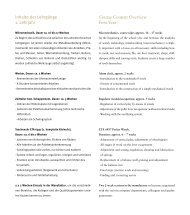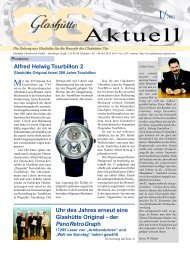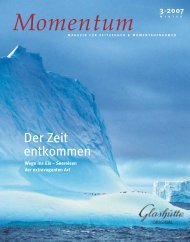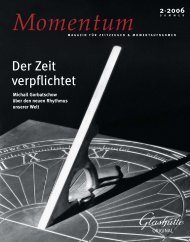2009 Momentum - Glashütte Original
2009 Momentum - Glashütte Original
2009 Momentum - Glashütte Original
Create successful ePaper yourself
Turn your PDF publications into a flip-book with our unique Google optimized e-Paper software.
of various groupings in civil society, including the Club of Rome,<br />
coming together and realizing that a practical plan had to be laid<br />
out if we were to achieve the objectives I described earlier; this<br />
plan would function as a guideline for the many committed individuals<br />
and organizations out there. The plan would have to<br />
demonstrate how to move forward into the future using various<br />
elements, some of which already enjoy broad international support.<br />
One such element is the fulfilment of the UN’s Millennium<br />
Development Goals by 2015. In 2000 an agreement to this effect<br />
was signed by 191 heads of state as part of the United Nations<br />
Millennium Declaration.<br />
The goals are very ambitious. In your opinion, is it better to set<br />
bold targets – in everyday life as well – or do you think it is better<br />
for morale to start with smaller, more easily attainable objectives?<br />
Yes, the goals are ambitious. Yet they are only the beginning. Of<br />
course it is simpler in everyday life to set more manageable goals.<br />
You might build a school, or campaign for better accessibility for<br />
people in difficult situations, or fight corruption. These are all<br />
important activities and the Global Marshall Plan supports all projects<br />
of this nature, such as those initiated by Rotary International. But we<br />
also believe that the problems facing our planet cannot be solved<br />
by concentrating on individual issues. Sometimes focusing too<br />
strongly on individual topics can lead to larger issues not receiving<br />
the attention they deserve. It is essentially the same as trying to<br />
solve the whole of the world’s problems starting with one person’s<br />
behaviour.<br />
Is idealism an important driving force behind progress, or are realism<br />
and pragmatism more useful?<br />
Idealism is an important driving force, but it is not the only one<br />
that matters. Some people are motivated more by idealism and<br />
altruism, others by taking a realistic and pragmatic approach. It is<br />
particularly helpful if the two stances are combined into what we<br />
call “insightful selfishness”. But both of them can be positive. It’s<br />
no coincidence that we work with the Global Ethic Foundation,<br />
an organization concerned with identifying the ethical principles<br />
that are common to all religions as well as to humanism. Many<br />
different things motivate people to do good.<br />
Are you a philanthropist; do you believe in the good in human beings?<br />
I believe that, in general, human beings are sociable and, above all,<br />
cooperative creatures. It is only thanks to our ability to cooperate<br />
that we have been able to survive as a species. One cannot change<br />
human nature, but we don’t have to. All we need is the right environment<br />
and the right conditions. Under those circumstances<br />
humans behave quite acceptably as a general rule.<br />
In which epoch of human history would you like to have been alive<br />
– which one would have been most interesting to you?<br />
Over the past four million years humanity has gone through a lot<br />
of different situations and experiences. I am particularly interested<br />
in looking at the various conditions under which we have lived in<br />
the past in order to gain a better understanding of our lives<br />
through out the ages to the present day. This goes as far back as our<br />
origins as a species and includes the development of our brain,<br />
language, intelligence, consciousness and technological capabilities.<br />
I am so curious to learn about all of this that I would actually like<br />
to have lived through all these epochs in one way or another. Of<br />
course, it would be better to do it from the safe perspective of today,<br />
perhaps by travelling through time and witnessing the particularly<br />
important events – from the comfort of a modern conveyance.<br />
What feelings do you have when you look into the future?<br />
In my opinion, the situation currently facing the people who live<br />
on this planet presents us with the challenge of remaining realistic<br />
under difficult circumstances. If we wish to overcome a problematic<br />
situation, we must first understand precisely what that situation is.<br />
We should know what our options are and what developments<br />
we might have to deal with. That is not a particularly pleasant prospect,<br />
even if our own personal situations are perfectly acceptable<br />
as yet. Crucial matters will be decided during the next 50 years,<br />
and the chances are good that I will have the opportunity to live<br />
through much of that time. If things start getting unpleasant, we<br />
cannot run away. That fact should motivate us to play an active<br />
role in shaping our futures positively. The chance of achieving<br />
this is not much more than 50 percent, but it is still a substantial<br />
one. There are good reasons to work together and steer the situation<br />
in our favour. Doing so will make life much more enjoyable. We<br />
can do a great deal for other people while benefitting ourselves<br />
at the same time.<br />
Some people have called you “a student of the future”. Has humanity<br />
really learned anything from the past that will help it do better<br />
in the future? Or are the challenges of the future so different as to<br />
make any amount of experience irrelevant?<br />
As I am a systems theorist and someone who explores the future, the<br />
future is something that naturally preoccupies me. However, I firmly<br />
believe that the future is linked to what has already happened.<br />
One can only understand the potential of the future after one has<br />
learned something from the past. And yes, of course, humankind<br />
learns from history, even though every individual starts afresh. The<br />
most obvious evidence of this is the governance systems that human<br />
beings have developed. We have translated our experience into<br />
structures that govern how we interact with one another and how<br />
<strong>Momentum</strong> 1· <strong>2009</strong><br />
11

















